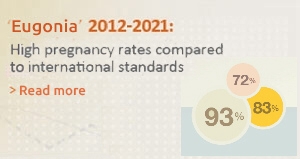During a natural cycle IVF there is no ovarian stimulation with drugs; we monitor the development of the single (predominant) follicle and of the endometrium with a series of ultrasound and hormonal tests. The natural cycle itself is a low cost procedure and carries minimal physical suffering. However, because of the occurrence of a high rate of premature and untimely ovulation and egg collection failure, combined with low success rates and a high probability of the cycle being cancelled, this treatment is rarely advised and has been replaced by the modified natural cycle (MNC).
In a modified natural cycle (MNC) low doses of drugs are administered during a natural ovulation cycle. Our goal is to collect one egg, but with a lower chance of canceling the cycle. The addition of drugs in specific days of the cycle, proper monitoring and measurements of the hormone LH that is responsible for premature ovulation, these are all factors that contribute in avoiding cycle cancellation, which has unpleasant consequences for the woman.
The MNC may include the administration of drugs such as the GnRH antagonist to avoid early surge of LH, gonadotropins and hCG to encourage maturation of the egg and support the corpus luteum.
To apply the MNC, deep knowledge and experience of the Antagonist Protocol are vital prerequisites. In Eugonia, we have published a series of studies in valid international scientific journals regarding this protocol and we have extensive experience in implementing it.
This method is the most common version of a natural cycle in IVF. It is advised to women who do not wish to receive high drug doses, while recent studies indicate that the modified natural cycle is associated with higher success rates in women with poor ovarian response. As such, indications for its application include poor ovarian response (not always related to the woman’s age), previous failed attempts, the desire of avoiding medication and contra-indications in pharmaceutical stimulation.
The advantages of natural cycles include the absence of ovarian stimulation, lack of side effects and complications, short duration of the cycle, low cost etc.
The disadvantages are the availability of only one follicle that we hope will contain one egg, which must be mature in order to be fertilized, it must divide and be able to create a good quality embryo that will be chromosomally normal with good dynamics, capable of being implanted in the uterus and give rise to a pregnancy. Thus, this treatment is considered to be associated with low pregnancy success rates.
Here in Eugonia, the experience and specialization in the MNC have led to considerable pregnancy rates.
Eugonia’s Contribution
Our team has published a study supporting that the MNC is related to a four-times higher possibility for live birth compared to the conventional protocol and the use of high dosage of gonadotropins in women with poor ovarian response.
Live birth rates after modified natural cycle compared with high-dose FSH stimulation using GnRH antagonists in poor responders.
Lainas TG, Sfontouris IA, Venetis CA, Lainas GT, Zorzovilis IZ, Tarlatzis BC, Kolibianakis EM.
Human Reproduction 2015;30:2321-30. See the publication































